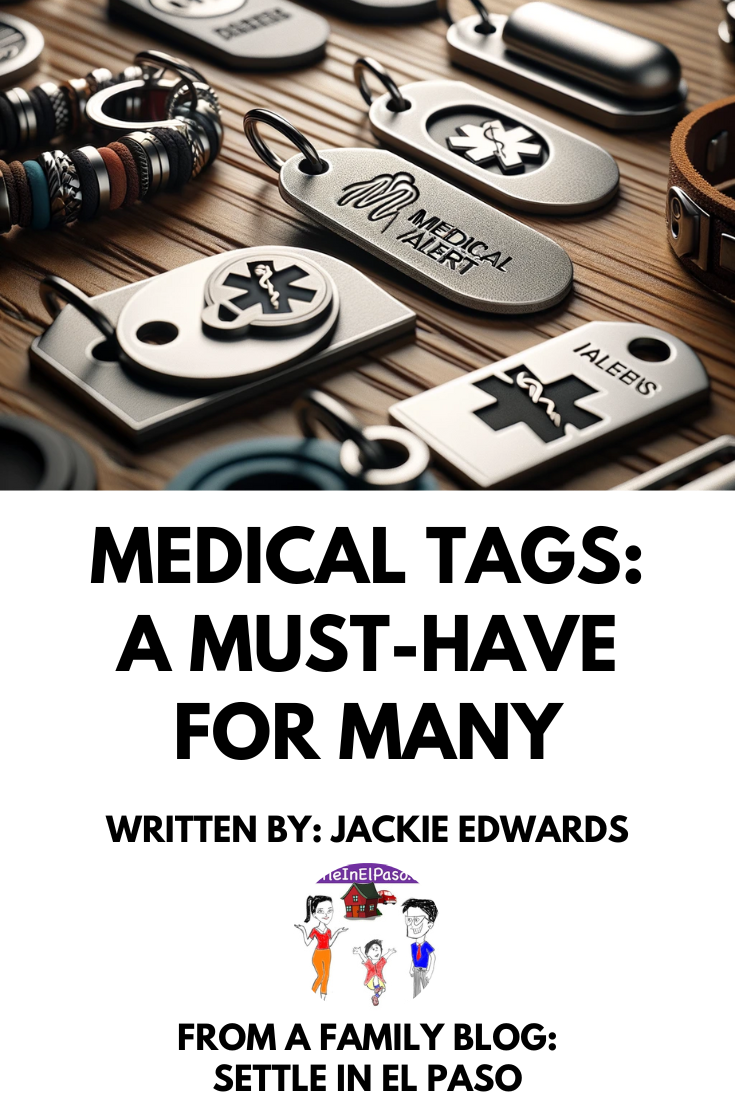
The following article is written by Jackie Edwards. Jackie is passionate about writing about family lifestyle. In this article, Jackie explains the importance of medical tags.
Approximately 60,000 patients seek treatment at the University Medical Center of El Paso’s Emergency Department annually, effectively making it among the city’s busiest. For residents and tourists alike, a trip to the emergency room is never on the agenda. When the unexpected does occur, however, a medical tag can be essential in communicating important information to both bystanders and medical professionals. From the many advantages of medical tags to how they can prove to be particularly imperative in El Paso, there are more than a few reasons why those with a medical condition should heavily consider wearing one.
The instrumental nature of emergency medical tags
Emergency medical tags are a form of identification that displays valuable information regarding a medical condition. In the event of an emergency, bystanders and medical personnel can identify the tags, giving them valuable insight into a patient when they’re unable to communicate valuable and potentially lifesaving information themselves. Emergency medical tags can come in the form of dog tags, a card, medallion, bracelet, or necklace, highlighting a variety of options. It’s important to note that medical identification tags are nothing new — dog tags, for instance, are perhaps one of the most well-known forms of identification tags, and have been used for many years as a form of identification in the military. Red dog tags are a variation of traditional tags, with their red color instrumental in signifying an underlying medical condition. While red dog tags are helpful in a military setting, however, general medical tags can be used by anyone with a serious condition.
The prevalence of medical conditions that can benefit from the use of medical tags is widespread — for example, El Paso is the sixth largest city in the state with a diabetes prevalence of 13.9% among adults (roughly 94,000 people), according to the El Paso Center for Diabetes. In addition to diabetes, individuals who experience conditions such as an allergy, heart conditions, or epilepsy can also benefit from medical tags. Disabilities, including autism, and even mental health conditions (like schizophrenia) can benefit from a medical tag as well. As a result, wearing a medical tag can prove to be instrumental in several different ways — for instance, knowing about a drug allergy can prevent medical personnel from administering the drug, while wearing a medical tag for a disability or mental health condition will allow medical personnel to better help a patient.
Factoring in El Paso’s conditions
Nobody plans for a medical emergency, further highlighting the value of preparation. However, it’s also essential to consider the natural aspects of El Paso, and how concerns — like the climate — can potentially contribute to unexpected scenarios. The dangers of excessive heat should never be ignored and is something prevalent in El Paso. In 2023, El Paso’s weather matched a long-standing record on Saturday, July 8th, “with a streak of 23 consecutive days of triple-digit temperatures,” stated the El Paso Times. According to the National Weather Service, the record has stood since July of 1994. While medical tags can serve as an effective method of communication in any medical emergency at any time of the year, they can be particularly instrumental during an El Paso summer, where concerns like dehydration and heatstroke can be of concern.
In a 2022 article in STAT, Aaron Bernstein, of Harvard T.H. Chan School of Public Health and other experts highlight that temperatures that reach 90 degrees Fahrenheit or higher can cause a variety of health issues — including dehydration, heat exhaustion, or heat stroke. Excessive heat can also lead to flare-ups and chronic conditions like migraines, arthritis, and cardiovascular disease (to name just a few), according to the article. Dehydration, for example, can not only contribute to life-threatening conditions in the form of heatstroke but can result in symptoms such as confusion and dizziness. In severe cases of dehydration or heatstroke, fainting or loss of consciousness can become symptoms as well, according to the Cleveland Clinic, further showcasing the value of medical tags.
Breaking the barriers of communication
According to one 2019 Business Insider post, more people in El Paso speak Spanish than English, making it the largest Spanish-speaking city in the country. While this highlights the diversity of the city, it’s imperative to consider the facts when getting a medical tag for yourself or a loved one. For those who only speak one language or the other, a medical tag with both languages present can be beyond helpful in communicating vital, lifesaving information to any individual who happens to be at the scene of a medical emergency — regardless of which language they speak. Not only can a bilingual tag provide anyone with the right information, but it can cut out the time that it would take for someone to find another person to translate in a situation where time may be the difference between life and death. With that in mind, ensuring that both Spanish and English text is present on a tag (or even doubling up by wearing one tag in English and another in Spanish) is a great way to prepare for the unexpected.
For those with a medical condition, a medical identification tag can play a key role should a medical emergency occur. In El Paso, medical tags can be particularly beneficial to both residents and tourists alike due to the diversity of the city and factors like the weather.



Comments
Facebook Comments